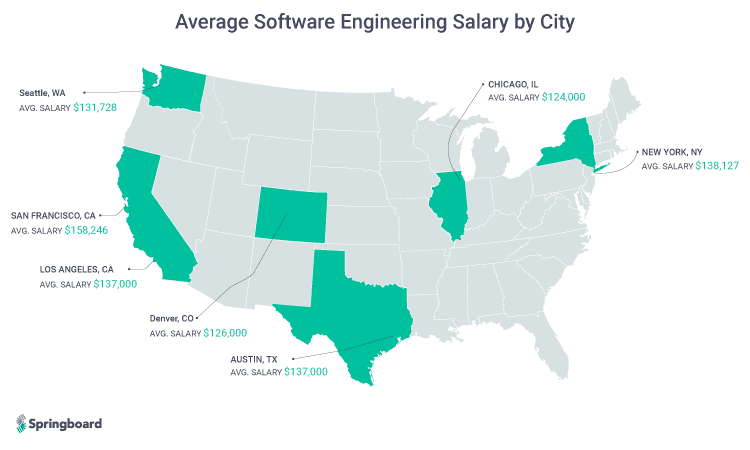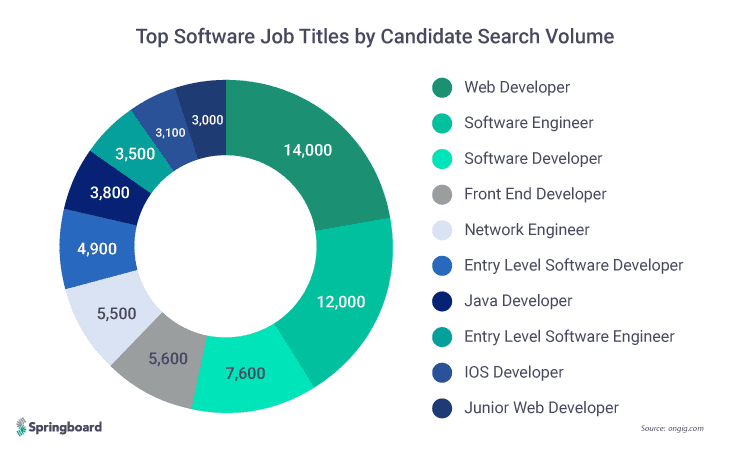Software engineers are responsible for building—or engineering—any kind of software. There’s no limitation in terms of software type on what this can be. Software engineers can create desktop programs like GarageBand or PowerPoint, or mobile and web applications like Instagram or Gmail.
What is a software engineer, and what do they do? Learn more about a typical software engineering job description, including key skills, responsibilities, and salaries, in this online guide.
What Is a Software Engineer and What Does a Software Engineer Do?
Software engineers typically work in teams to build programs, platforms, and applications. While some software engineers can build both the front-end (user interface) and back-end (the code that makes the program functional), it’s not uncommon for engineers to develop a specialty in one or the other.
Software engineers can take their talent to almost any industry producing technology: video games, business solutions, mobile applications, and network control systems are all built by software engineers.
Related Read: What Is Software Engineering?
What Is the Average Salary of a Software Engineer?
According to Indeed, on average, software engineers earn an average salary of $109,330 annually in the United States. An entry-level software engineer can expect to make an average of $86,000.
The compensation varies across cities. The three highest-paying cities for software engineers are as follows:
- San Francisco: $158,246
- New York: $138,127
- Seattle: $131,728
Related Read: 12 Highest-Paying Software Engineering Jobs

What Is a Typical Software Engineer Job Description?
The job description of a software engineer will usually feature three sections that break down the roles and day-to-day responsibilities of a software engineer. Potential software engineering candidates will be expected to:
- Have the foundational knowledge and capability to use one or more programming languages
- Analyze program needs, and tailor-designed software solutions to users using a problem-solving approach
- Create and analyze visual diagrams and methods that communicate the necessary code components to other team members and explain how they might function together
- Observe program functionality throughout various testing, development, and production phases and environments
- Collaborate with a team of software engineers, designers, and data scientists to optimize and iterate on software solutions
Get To Know Other Software Engineering Students
Elena Nurullina
Junior Web Developer at G/O Media
Jack Mayer
Software Engineer at Whitepages
Abdelkareem ElSharief
Software Engineer at Bread
What Qualifications Do Entry-Level Software Engineers Need?
In order to qualify for an entry-level software engineering job, aspiring candidates will need to be proficient in at least one programming language and have a fundamental understanding of the software development process. Knowing your way around multiple programming languages is the easiest way to showcase your skills during a software engineering job interview.
Below is a list of the most popular programming languages used in many software engineering jobs:
- Python
- JavaScript
- Java
- C#, C, and C++
- Ruby
- PHP
- R
However, having good communication skills as well as an aptitude for logical thinking and problem-solving will make the difference between a good and a great software engineer.
Learn more about how to build an effective entry-level software engineering resume here.
Code reviews are a crucial part of every software engineer’s journey, and having the ability to not only develop solutions but also explain their logic and reasoning to peers and team leaders is highly important. A synergistic result of both sets of skills results in an excellent ability to make tests—and know how to use them to iterate around new solutions.
Learn more about how to become a software engineer here.
What Are the Key Skills of a Software Engineer?
Software engineers always have a very wide range of skills. While technical proficiency in a programming language is usually listed as a core competency, software engineers often also need coding-adjacent skills that help their teams set benchmarks, establish tests, and innovate on existing systems. Because of the iterative nature of software engineering roles, candidates should also come equipped with interpersonal skills.
While software engineers job specs will vary across different industries, most hiring managers focus on:
- Technical skills. Every software engineering job profile will include a series of hard skills, including knowing how to build software, tests, and code reviews, and using a programming language.
- Interpersonal and collaborative skills. Software engineers will always be working in teams as they build, test, and deploy solutions through various environments, so collaboration is key. Most software engineer role descriptions will mention excellent organizational skills and a roll-up-your-sleeves work ethic.
Learn more about the essential skills a software engineer needs here.
6 Common Software Engineer Job Roles
A software engineer’s job role determines the type of work they focus on when building or supporting a product. A typical software engineer role will require applicants to have a firm grasp and knowledge of computing systems, technical architectures, and algorithm building.
Six common software engineering job roles are:
- Front-end engineer
- Back-end engineer
- Full-stack engineer
- QA engineer
- DevOps engineer
- Security engineer
Learn more about the key roles of a software engineer here.

What Are the Key Responsibilities of a Software Engineer?
Software engineers use their skills across engineering, analytical thinking, and mathematics to design, develop, and test software applications for computers.
A typical software engineer’s job responsibilities may include:
- Research
- Design
- Implementation
- Support
Since you’re here…
Interested in a career in software engineering? Join our mentor-led Software Engineering Bootcamp or our foundational Software Engineering Course if you’re just starting out. We help people make the switch every day (just peep our reviews). You can do it, too!
What Are New Technologies I Could Specialize In When I Become a Software Engineer?
Software developers can specialize in a number of exciting new fields and software systems, including:
Artificial Intelligence (AI) and Machine Learning (ML)
These technologies are being applied in areas such as natural language processing, computer vision, and data analysis. Software engineers are leveraging AI and ML to develop intelligent applications, automate processes, and extract insights from vast amounts of data.
Internet of Things (IoT)
IoT involves connecting everyday objects to the internet, enabling them to send and receive data. Software engineers are involved in developing the software infrastructure to support IoT devices and creating applications that leverage the data collected from these devices.
Cloud Computing
Cloud platforms provide scalable and on-demand access to computing resources. Software engineers are utilizing cloud technologies to develop and deploy software applications, taking advantage of the flexibility, scalability, and cost-effectiveness that the cloud offers.
Blockchain
Blockchain technology provides a decentralized and secure way to store and verify data. Software engineers are exploring the use of blockchain for applications such as secure transactions, smart contracts, and data integrity.
DevOps
DevOps is an approach that combines software development and IT operations, emphasizing collaboration, automation, and continuous delivery. Software engineers are adopting DevOps practices to streamline the software development lifecycle, enhance collaboration between development and operations teams, and accelerate software delivery.
Augmented Reality (AR) and Virtual Reality (VR)
AR and VR technologies are transforming various industries, including gaming, education, and healthcare. Software engineers are involved in developing immersive experiences, creating 3D environments, and integrating AR/VR capabilities into software applications.
Frequently Asked Questions: Software Engineering
What is software engineering and what do software engineers do?
Software engineering is a discipline that involves the application of engineering principles and practices to develop and maintain software systems. Software engineers are professionals who use their technical skills and expertise to design, develop, test, and maintain software applications, ensuring they meet the requirements and standards set by clients or organizations.
How do I become a software engineer and what skills are required?
Software engineering requires a combination of formal education and practical experience is typically required. Most software engineers have a degree in computer science or a related field. You can enter the software engineering field through self-study and online resources. Some of the key skills in software engineering include proficiency in programming languages, understanding of data structures, knowledge of software development methodologies, problem-solving abilities, and strong communication skills.
What is the role of programming languages in software engineering?
Programming languages play a crucial role in software engineering as they are used to write code and develop software solutions. Different programming languages have their own strengths and weaknesses, and software engineers often choose the most appropriate language for a particular task or project. Common programming languages used in software engineering include Java, Python, C++, and JavaScript. The choice of programming language depends on factors such as project requirements, performance considerations, and the target platform.
What is the software development lifecycle and why is it important?
The software development lifecycle (SDLC) is a structured approach that describes the stages involved in the development of software applications. It typically includes requirements gathering, system design, coding, testing, deployment, and maintenance. The SDLC is important because it provides a systematic framework for managing the software development process, ensuring that projects are completed on time, within budget, and with high quality. It helps in identifying and resolving issues early, improving collaboration among team members, and ensuring customer satisfaction.
How do software engineers design and develop software applications?
Software engineers follow a systematic process to design and develop software applications. They start by understanding the requirements and specifications provided by stakeholders. Then, they create a design that outlines the structure and behavior of the software. Next, software engineers write code using programming languages to implement the design. They conduct testing to identify and fix any bugs or issues. Finally, they deploy the software and provide ongoing maintenance and support.
What is the importance of technical expertise in the field of software engineering?
Technical expertise is crucial in the field of software engineering as it allows software engineers to understand complex systems, solve intricate problems, and make informed decisions. As a software engineer, you’ll need a deep understanding of programming languages, algorithms, data structures, software architecture, and various software development tools and technologies. Technical expertise enables software engineers to develop efficient and reliable software solutions, optimize performance, and ensure scalability and security.
How do software engineers collaborate in development teams?
Software engineers collaborate in development teams to work on projects collectively. They often follow agile methodologies, such as Scrum, where they break down the work into smaller tasks, assign responsibilities, and coordinate their efforts. They use collaborative tools, version control systems, and communication platforms to share code, discuss ideas, and track progress. Effective collaboration in development teams fosters creativity, knowledge sharing, and efficient problem-solving.
What is the role of quality assurance analysts in software development?
Quality assurance analysts play a critical role in software development by ensuring that software applications meet the required quality standards. They design and execute test plans, identify and report bugs or defects, and verify that the software functions as intended. Quality assurance analysts work closely with software engineers to understand the requirements, develop test cases, and perform various testing activities. Their role helps in delivering high-quality software products, enhancing user experience, and maintaining customer satisfaction.
What are the career prospects and salary potential for software engineers?
The career prospects for software engineers are generally very promising, given the increasing demand for software solutions across industries. With the rapid advancement of technology, the need for skilled software engineers continues to grow. Job opportunities can be found in various sectors, including software development companies, IT consulting firms, government agencies, and startups.






